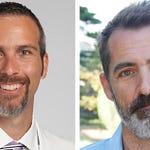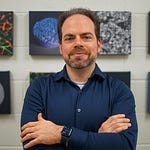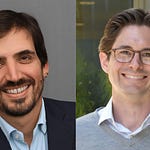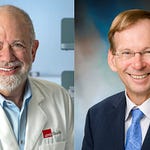Chapters:
0:00 Naturalizing mental concepts: a thorny issue with modern science
4:55 Sapolsky a closet dualist?
10:20 The self and agency - being its own cause
18:48 The motility argument
23:45 Value, purpose, and meaning are new in biology
32:05 On the animal scale
40:30 Bottom-up vs top down
44:55 Implications for biology and philosophy
51:30 Robots and AI
Today, we continue “The New Biology” series with a non-reductive geneticist from Trinity College in Dublin. Kevin Mitchell is the author of Free Agents: How Evolution Gave Us Free Will.
The problem of free will has dogged philosophers and scientists as much as any question going back to the Greeks. Determinism, typically argued by physicists, usually goes something like: the laws of physics predict the future; therefore, there is no free will. In our lives, however, the experience of making choices is fundamental to our well being, to our culture and our morality. There would not be a legal system without free will. Or is the Supreme Court just an illusion, as determinists say about free will? Does the murderer always have an alibi?
Kevin says at the core of the debate is the question of “the self" and whether it can be its own cause. He explains how single cells first developed “motility” and argues this presented new possibilities in agency.
“The environment may be so inhospitable that you need to move, especially if you’ve been dividing and dividing and using up all the food. Being able to move is a really good trick, and then you must ask, well, where? Which way should I move? Moving toward a food source and away from a threat becomes selectable over time,” says Kevin.
Does Kevin think of this single cell that has just learned to move as an "agent?” (The Latin root for agent is “agere,” meaning to do, to move.) As life evolved, Kevin argues, it developed purpose and meaning which will guide it in a “top-down” way.
What are the broad implications of Kevin’s work on free will for further study of biology and philosophy? How might his thinking extend to robots and AI?
We finish with a discussion on reductive and non-reductive biology.
Note: Coincidentally, another book written by a biologist arguing the other way on free will hit shelves at the same time Kevin’s book came out. In Determined: A Science of Life Without Free Will, Stanford neuroscientist Robert Sapolsky uses biology to argue that we do not have free will. We have invited Robert to the program.











